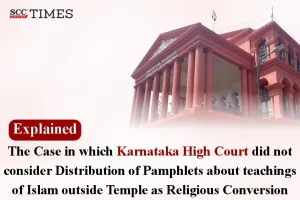Karnataka High Court: In a criminal petition filed by the accused and others for quashing the complaint and First Information Report (‘FIR’) registered against them for offenses punishable under Sections 299, 351(2), and 3(5) of the Bharatiya Nyaya Sanhita, 2023 (‘BNS’), and Section 5 of the Karnataka Protection of Right to Freedom of Religion Act, 2022 (‘KPRFR Act’), for distributing pamphlets promoting Islam in Ramatheerth Temple the Single-Judge Bench of Venkatesh Naik T, J*., quashed the FIR holding that the complainant lacked locus standi and the allegations in the FIR failed to satisfy the essential elements of offence under section 3 of the KPRFR Act. The Court observed that there were no allegations made against the accused of converting or attempting to convert any person to another religion.
Background
On 04-05-2025, when the complainant visited the Ramatheerth Temple, a group of individuals were distributing pamphlets promoting the teaching of Islam and verbally explaining their religious beliefs. When the complainant and other devotees approached the individuals to inquire about their activities, they began criticizing Hindu Religion, allegedly making derogatory remarks. They further claimed their mission was to “make the whole world turn towards Islam” and threatened that anyone obstructing their efforts would face severe consequences, stating, “we will not spare your lives”. These individuals were also offering material incentives, such as vehicles and job opportunities in Dubai, to entice people to convert to Islam. When confronted, the individuals disclosed their names, and the complainant then lodged the complaint, based on which police registered a case, leading to the registration of an FIR and investigation. Aggrieved by this the accused filed the present petition.
Analysis and Decision
The Court observed that the complainant was not a competent person to lodge the complaint as enumerated under Section 5 of the KPRFR Act. The Court noted that Section 3 of the KPRFR Act prohibits conversion from one religion to another through misrepresentation, force, fraud, undue influence, coercion, allurement, or promise of marriage. It states that no person shall convert or attempt to convert directly or otherwise another person from one religion to another using any of these means, nor shall anyone abet or conspire to facilitate such conversion. Further, Section 4 of the KPRFR Act specifies who is competent to lodge a complaint, limiting it to the converted person, their parents, siblings, other relatives by blood, marriage, adoption, or association. Section 5 of the KPRFR Act prescribes punishment for those who contravene Section 3. The Court observed that the complaint was lodged by a third party, who did not fall within the category of persons enumerated under Section 4 of the KPRFR Act. Therefore, registration of FIR by the person who lacks locus standi was legally invalid.
Further, the Court observed that even if the allegations in the FIR were accepted at face value, they failed to satisfy the essential elements of an offence under Section 3 of the KPRFR Act. There was no allegation that the accused converted or attempted to convert any person to another religion. The absence of these essential elements rendered the allegations insufficient to constitute an offence under the KPRFR Act.
In light of the afore-stated reasons, the Court allowed the criminal petition and quashed the FIR against the accused registered for the offenses punishable under Sections 299, 351(2), and 3(5) of BNS and Section 5 of KPRFR Act.
[Mustafa v. The State, 2025 SCC OnLine Kar 12650, decided on 17-07-2025]
Advocates who appeared in this case :
For the Petitioner: Iftekhar Shahpuri for Anwarali D. Nadaf, Advocate
For the Respondent: Abhishek Malipatil, HCGP

